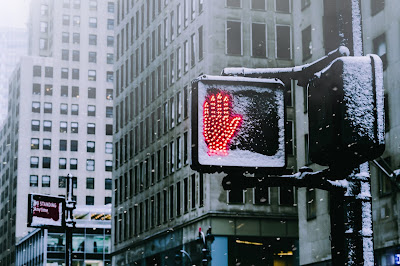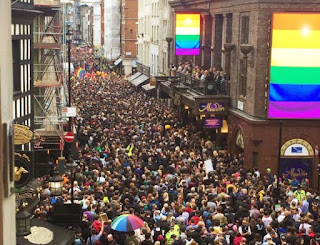White People, Please Stop Using Your Well-Meaning Outrage to Bypass the Real Work that Needs to be Done
If I may, I would just like to have a word with the other white folks like me who consider themselves to be anti-racism. This segment of the population has a hard time realizing how they’re part of the problem. Just because you’re not a hater and just because you care about racial equality doesn’t mean you get to rest on your laurels. Chances are, you’re perpetuating racial tensions without even knowing it.
I’m having a hard time today as I observe all of the outcries against the racial injustices that are blowing up the internet because what I am observing is all of the well meaning white people doing what well meaning white people always do — making it about them while thinking they’re talking about justice.
When will this stop? I am so upset! (notice how you’re talking about yourself?)
I am shocked and irate by the news today. (notice how you’re talking about yourself?)
I am outraged that this has happened yet again! (notice how you’re still talking about yourself?)
I understand that these responses are intended to show support and solidarity. But those rants only serve one thing: to defend your stance as a non-racist person. It’s ego stroking. It’s a declaration to your friends and yourself saying, “look at what a good person I am because I’m upset by this”. It is an opportunity to declare yourself as an ally because that feels good to you. If you don’t see that you’re not looking hard enough. I’m not seeing the posts that ask questions about how to help or that offer solace and apology towards the people who are suffering the most.
I’m not saying you shouldn’t feel outraged (we should), I’m not saying we shouldn’t be talking about it (we should). I’m inviting you to examine, very closely, how you express yourself publicly and to get very clear about your statements and if they are actually helpful in regards to social change.
“White progressives can be the most difficult for people of color because, to the degree that we think we have arrived, we will put our energy into making sure that others see us as having arrived. None of our energy will go into what we need to be doing.” ~Robin Diangelo, author of White Fragility
As a white person I want to be educated about any hidden, lurking undercurrents of racism or prejudices in myself. The fact that I am not aware of any doesn’t mean they aren’t there, it means I’ve identified the first problem. I want to take steps to educate myself. Those steps do not include scrolling my mostly white newsfeed and commiserating with other outraged white people. That’s just solidarity with other privileged white people. Likewise, it’s not helpful to post about my own outrage in response to the latest round of deplorable, racially charged injustices because IT’S NOT ABOUT ME. Ranting online isn’t solution-oriented, it’s just an opportunity to talk about myself and how “anti-racist” I am.
If we truly want to be solution oriented, if we truly want to be allies for the sake of equality and not the sake of ego, there’s some unpacking us anti-racist white people need to do.
First, have you been listening to the black people’s responses to the white people’s “outrage”? They are telling us what needs to change. They are pointing out our shortcomings. They are showing us how, in all of our well meaning commentary, we are coming at these injustices inappropriately. But we don’t seem to be listening because every single time the news blows up with another innocent black person getting harassed or killed, the cycle is exactly the same. White folk taking to the internet to express how outraged they are. White folk talking about themselves. Their outrage. Their feelings. That’s not solidarity. That’s self aggrandizing.
Second, check yourself. When I first heard about the Christian Cooper/Amy Cooper video — before I knew the story, before I saw the video — when the only piece of information I had was “there was an altercation between a white woman and a black man over leash laws in Central Park” do you know what my reflex response was? Exasperation. Inward eye roll. I thought to myself, if it were two white people having an argument over a dog on a leash it would be a non-issue, but just because one of the people happens to be black, now it has to be about race. Then I watched the video. And I was like, Oh shit. Obviously, that wasn’t a normal altercation over leash laws, that really was some heinous racist bullshit. My first reaction though? That’s a problem. That’s what I’m looking at. I am not jumping on social media to vent about MY outrage (see how that’s just “look at me!” oriented?). I’m choosing instead to look at the subtlety of my own biases. I’m thinking that it’s only a privileged white person that would think something like why does everything always have to be about race? I’ve gotta unpack that. That kind of unpacking, the kind that can affect real change, happens through quiet reflection of what is in my heart and in my mind. It doesn’t happen in a twitter post.
Third, be aware of how what you’re saying might be doing more harm than good. I am uncomfortable writing this. I am incredibly uncomfortable writing about race because I don’t want to say the wrong thing. I don’t want to offend. I don’t want to reek of white privilege. And I am aware of how likely it is that I will say the wrong thing. Every time white people declare their outrage at racial inequality and attempt to declare their solidarity with black people, what I am noticing is the responses by people of color to those declarations. If you are paying attention, they point out for us how those well meaning, “anti-racist” comments are often offensive or upsetting (for a good example of this check out https://www.instagram.com/p/CAqpQ0-nq8J/). And that’s something important right there — we don’t even know that we don’t know how to talk about race in a inoffensive way. Our dialogues are stunted because we don’t truly know what people of color are feeling or thinking because we aren’t listening, we are too busy ranting our outrage to our other white friends. If we are truly allies we will get off our soapbox and instead spend our time figuring this out.
Fourth, educate yourself. As a white person who has spent her entire life in predominately white circles it is MY responsibility to find other voices and other viewpoints. I go searching for books, articles, podcasts. I am interested in discovering how I can become more aware, sensitive, and helpful (helpful being the key word here) in regards to racial injustice. I choose to learn about the perspectives of anyone who isn’t white. I choose to find authors, bloggers, poets, and speakers who are Black, Muslim, Latino. I want to hear their voices. I want to know their stories. I let them show me what their world is like and what it feels like for them when white people “don’t get it”. I pay attention to what they are saying so I can better understand my own shortcomings in matters of racial inequality. I stay open and willing to learn without putting the burden of my ignorance on their shoulders — I do not say, “people of color, please teach me what it is like for you so I can understand ” because people of color do not owe us shit. We owe it to them to educate ourselves, to go looking for their voices and their stories, and to discover all the little nuances in our speech, perspectives, and beliefs that do not line up with true solidarity.
Fifth, stop hiding behind your non-white friends and family. I believe in equality. I believe ALL lives matter. Two of my closest friends are people of color, and my partner is Latinx. This does not mean I get to rest in a dangerously false belief that I don’t have any prejudices. I do not get to use my non-white friends to pretend I know what it’s like for people of color or that I don’t have anything to learn. I do not get to trot around social media declaring my outrage in a manner that suggests I have nothing to learn about race because “I have friends who aren’t white”. That’s just another way that anti-racist white people bypass looking at their potential prejudices and potential for change. I want to acknowledge, examine and close the gaps in my lack of awareness because that is a small but important part of the work that needs to be done. I am not going to believe that just because I don’t hate black people and just because there are people of color in my valued circle, I don’t have work to do. As long as I’m white, there’s work to do.
The fact that human beings are still being treated unfairly and violently because of the color of their skin needs to stop. How do we stop it? How do we do our part to create a society where black people are safe and feel safe taking a walk in the park or a trip to the store? These are big, important questions that will never, ever be solved by white people responding to racist events by simply taking to social media to declare their outrage and then walking away. Outrage is good but only if we let it fuel us towards useful action. Towards learning. Towards helping. It’s not about us getting an ego hit from advertising our allegiance to a cause, it’s about us learning how to be genuinely helpful. We need to be looking at the people who this is really about and taking their lead, listening to what they need versus thinking we already know. Lets put down our righteousness and learn from the people who are most affected by and have the most to lose from racism so that we can stand with them in a true front of solidarity against injustice.



Comments
Post a Comment